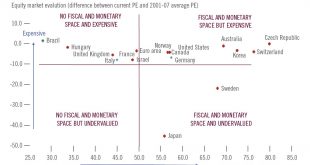In a Carnegie-Rochester paper from 1979, Robert Lucas reviews an earlier report to the OECD by a group of independent experts. Lucas views the report as vacuous, eclectic, and dangerous: … I know of no other way to convey the Report’s undisciplined eclecticism. It meanders through the long list of issues which have been defined in popular debate as “policy problems,” accepting all as equally suited to treatment by government action and equally amenable to economic expertise, offering...
Read More »Comments on Geneva Report 23
Panel with Elga Bartsch, Agnès Bénassy-Quéré, Giancarlo Corsetti, Olivier Garnier, and Charles Wyplosz. Moderated by Tobias Broer. Elga Bartsch, Agnès Bénassy-Quéré, Giancarlo Corsetti, Xavier Debrun: Geneva Report 23 | It’s All in the Mix: How Monetary and Fiscal policies Can Work or Fail Together. Event at PSE. My comments on the report.
Read More »“Wirtschaftspolitik in Corona-Zeiten (Economic Policy in Times of Corona),” FuW, 2020
Finanz und Wirtschaft, December 9, 2020. PDF. Economic policy is not about GDP growth. It’s about welfare. Externalities are key. Infection externalities don’t go away by calling for responsible behavior. Infection externalities can turn positive. Keeping worthy companies or networks alive does not require government intervention, unless capital markets don’t work. To judge the right amount of burden sharing is beyond economics. But economics gives some clues: In an ideal world,...
Read More »Policy space may help only a few markets
Risk markets where there is room to loosen policy but are undervalued look more attractive than those where the authorities have room to manoeuvre but markets are expensiveAt this mature stage of the business cycle, it makes sense to consider the possible next steps in economic policy, given that we believe it is likely that central banks and governments will do their utmost to prop up the bull equity market as well as economic growth. (This will be especially true in the US as the 2020...
Read More »“Nicht-Wissen kann schützen (Knowing Less Protects),” FuW, 2018
Finanz und Wirtschaft, November 24, 2018. PDF. Ökonomenstimme, November 26, 2018. HTML. European firms dealing with Iran face U.S. “secondary sanctions.” European counter measures (including a blocking statute) prove toothless. Even central banks in the European Union surrender to U.S. pressure, as does SWIFT. Ignorance is bliss: For a sovereign, the best protection against foreign states pressuring to monitor domestic citizens and businesses may be to know as little as possible.
Read More »“Nicht-Wissen kann schützen (Knowing Less Protects),” FuW, 2018
Finanz und Wirtschaft, November 24, 2018. PDF. Ökonomenstimme, November 26, 2018. HTML. European firms dealing with Iran face U.S. “secondary sanctions.” European counter measures (including a blocking statute) prove toothless. Even central banks in the European Union surrender to U.S. pressure, as does SWIFT. Ignorance is bliss: For a sovereign, the best protection against foreign states pressuring to monitor domestic citizens and businesses may be to know as little as possible.
Read More »BoJ Briefs Reuters: We’ll Let 10-Year Yield Rise Above Zero Percent Target Around 1Q 2018
It looks like BoJ Governor, Haruhiko Kuroda’s, minions are getting out and about to brief the financial news services that the biggest stimulator of all the central banks might reduce stimulus earlier than expected. The recipient of the unofficial briefings by BoJ officials is Reuters, which has this to say. The Bank of Japan is dropping subtle, yet intentional, hints that it could edge away from crisis-mode stimulus earlier than expected, through a future hike in its yield target,...
Read More »Neoliberalism—Narrow and Broad
In the Boston Review, Dani Rodrik discusses neoliberalism and argues that mainstream economics shades too easily into ideology, constraining the choices that we appear to have and providing cookie-cutter solutions. Rodrik emphasizes that sound economics implies context specific policy recommendations. And therein lies the central conceit, and the fatal flaw, of neoliberalism: the belief that first-order economic principles map onto a unique set of policies, approximated by a...
Read More »“Makroökonomie hat nicht versagt (It’s Not Macroeconomics That Let Us Down),” FuW, 2017
Finanz und Wirtschaft, August 2, 2017. PDF. Macroeconomists are neither forecasters nor economic policy makers. They devise models. Economic policy makers are in charge of applying them.
Read More »ECB Assets Hit 35 percent Of Eurozone GDP; Draghi Owns 9.2 percent Of European Corporate Bond Market
As global markets bask in the glow of the Trumpflation recovery, the ECB continues to be busy providing the actual levitating power behind what DB recently dubbed global “helicopter money“, by buying copious amounts of bonds on a daily basis (at least until tomorrow when the ECB goes on brief monetization hiatus, and Italy will be on its own for the next two weeks). According to the latest weekly breakdown of what the...
Read More » Swiss Economicblogs.org
Swiss Economicblogs.org



